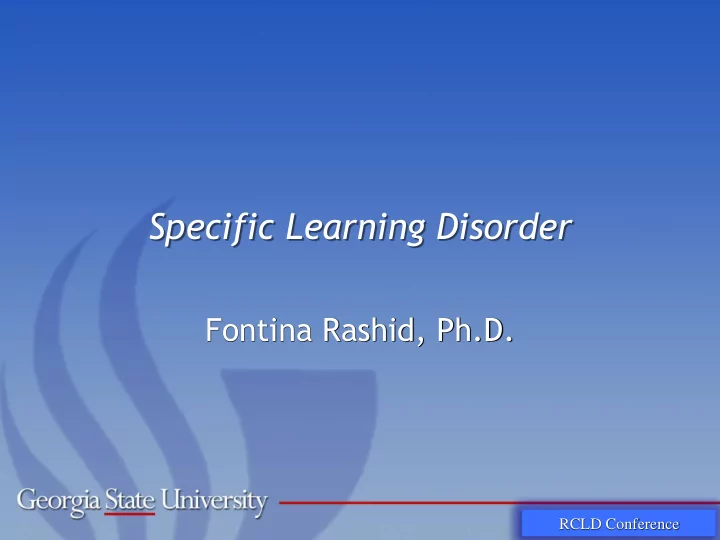

Specific Learning Disorder Fontina Rashid, Ph.D. RCLD Conference
Criteria • DSM-5 • Persistent difficulty learning academic skills • Reading • Written Expression • Mathematics • Academic performance is below expectation • Difficulty apparent in early school years • Difficulty not better accounted for by other neurological disorder RCLD Conference
Specifiers • Reading • Word reading (dyslexia) • Reading rate or fluency • Reading comprehension • Written Expression • Spelling • Grammar and punctuation accuracy • Clarity or organization of written expression RCLD Conference
Specifiers • Mathematics • Number sense • Memorization of math facts • Accurate or fluent calculation • Accurate math reasoning RCLD Conference
Outcomes • Increased risk: • Dropout • Lower educational attainment • Psychological distress • Unemployment or underemployment RCLD Conference
Misconception • Learning Disorders are the same as other disorders that impact learning RCLD Conference
Differential Diagnosis • Intellectual Disability • ADHD • Autism Spectrum Disorder • Normal variation *co-morbidity is common RCLD Conference
Misconception • Learning Disorders correspond to low IQ RCLD Conference
Misconception • Prevalence has increased RCLD Conference
Specifiers/Prevalence • Prevalence • 5-15% (based upon children) • More frequent diagnosis in males (2:1 or 3:1) • 80% of cases are in reading RCLD Conference
Misconception • Learning Disorders fade with time RCLD Conference
Course • Persists into adulthood • High school to college • Slow reading rate, comprehension, written expression, math problem solving RCLD Conference
Misconception • Learning Disorders are easy to diagnose RCLD Conference
Diagnosis • Discrepancy between IQ & achievement • Historically popular • Research does not support • Response to intervention • Progress monitoring and intervention • Just focuses on low achievers • Cognitive processes • Cognitive processes that underlie achievement RCLD Conference
Assessment • Comprehensive evaluation • IQ • Reading • Writing • Math • Information processing • Attention/executive functioning • Language • Memory • Visual • Social/Emotional Functioning RCLD Conference
Typical Processing Weaknesses • Word decoding • Phonological awareness (rapid naming, processing speed • Reading Fluency • Rapid naming (processing speed, orthographic competence) • Comprehension • Language • Listening comprehension • Working memory RCLD Conference
Typical Processing Weaknesses • Written Expression • Spelling • Language • Executive functioning • Math • Working memory • Executive functioning • Language RCLD Conference
Dyslexia • Misconceptions: • All children who reverse letters have dyslexia • People with dyslexia see things backwards • People with dyslexia never learn to read well • Dyslexia is a medical diagnosis RCLD Conference
Dyslexia • Misconceptions • Can be treated with: • Fish oil • Tinted lenses • Balancing exercises • Vision therapy • Medication RCLD Conference
Accommodations • Idea to “level the playing field” • Based upon results of the evaluation • Must consider other factors RCLD Conference
Common Accommodations • Extended Time • Word Processor • Voice Recognition • Screen reader • Calculator • Formula Sheet • Word Bank • Scantron RCLD Conference
Common Accommodations • Note taking asst. • PowerPoint • Audio books • Written notice • Extended time • Group projects • Extended • Relaxed deadlines attendance • Foreign language • Classroom breaks sub RCLD Conference
Case Example #1 • 18 year old, Caucasian male • High school graduate (3.96 GPA) • College freshman • No significant medical history aside from ear infections and tubes • Healthy, college athlete RCLD Conference
Case Example #1 • History of reading and spelling difficulty – since 3 rd grade • Diagnosed and received services through an IEP • Current – slow reader, poor speller • No problems with math • Previously diagnosed ADHD - pediatrician • Inconsistent medication (2 years) RCLD Conference
RCLD Conference
Case Example #1 • Weaknesses • Reading • Decoding • Rate • Spelling • Phonological processing RCLD Conference
Case Example #1 • Diagnosed with Dyslexia • IQ = high average • Solid skills – • sensorimotor • attention/executive functioning • Visual spatial • Memory • Language • Social/emotional RCLD Conference
Accommodations?? RCLD Conference
Case Example #2 • 20 year old, Latin/African American male • Graduated high school (3.3 GPA) • College sophomore • Parents both have master’s degrees • Medical history – scarlet fever, ear infections, tonsillectomy/adenoidectomy RCLD Conference
Case Example #2 • History • Speech and writing weaknesses • Speech therapy • Repeated kindergarten • Diagnosed with CAPD, ADHD • 504 Plan - second grade (+ private tutoring) • Treated for anxiety • Therapy • Medication briefly in high school RCLD Conference
Case Example #2 • Reported difficulties: • Staying focused/daydreaming • Careless mistakes • Studying and completing assignments on time • Organization for writing • Worry about making mistakes • Anxiety related to making friends • Feels “awkward,” avoids RCLD Conference
RCLD Conference
Case Example #2 • Diagnosed with • ADHD, combined • Parent and self-report (past and current) • CPT scores and executive functioning weaknesses • Observations (organization) • Generalized Anxiety Disorder • Worry, nervousness, muscle tension, fatigue, restlessness, sleep disturbance • Difficulty controlling worry • Mood impacted by anxiety RCLD Conference
Case Example #2 • Diagnoses (cont.) • Specific Learning Disorder – Reading • Rate or fluency • Weak rapid naming, phonological memory, executive functioning • Earlier testing did not indicate academic achievement weaknesses (7 years ago) RCLD Conference
RCLD Conference
Recommend
More recommend